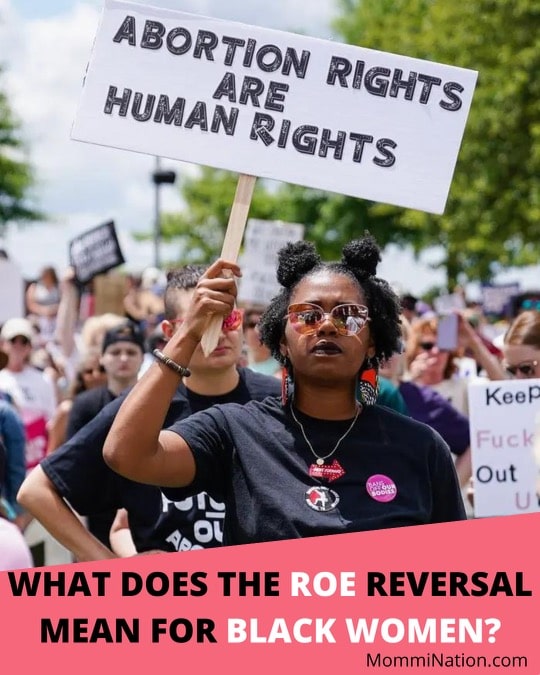What Does the Roe Reversal Mean for Black Women?
MommiNation sat down with lawyer and political scientist, Dr. Nikol Alexander-Floyd to discuss the Dobbs v. Jackson decision that overturned Roe vs. Wade after 50 years.
MommiNation: Let’s start with what is probably the most foundational question we can ask: what is the Roe decision? What rights did that law afford to women?
Dr: Alexander-Floyd: First, thank you for giving me this opportunity to speak with MommiNation. One of the things that is important to understand about Roe as a landmark decision is that it legalized abortion access. Prior to that time, people who were of means were able to access abortions. Roe was foundational because it allowed people to have access to legal abortion on demand. And, one of the things that I would like to underscore, and many Black feminists underscore this point, is that when we think about Roe v. Wade, oftentimes people will associate that with feminism, which is read as White. We don’t make the connection to how this law affects people in general, and how it affects Black communities, including Black women.
Reproductive Justice
MommiNation: You say that this Roe decision has to be understood in terms of “reproductive justice.” What do you mean?
Dr. Alexander-Floyd: The frame of reproductive justice, as opposed to a specific focus just on abortion rights, has been something that Black feminists have really embraced because we have to think about a holistic understanding of what it means for us to choose to have children or not have children, and then have the capacity to raise them so that they can be healthy in every dimension of their being. Reproductive justice, as Black women have developed that concept, is not only about access to abortion, it is about access to health care, access to a livable planet, access to clean water, to nourishment. It’s a quality of life issue. It’s a human rights issue.
The Griswold Case
MommiNation: Justice Clarence Thomas has asserted that the court should consider other cases including Griswold. What is the Griswold case, and how is it related to Roe and the issue of abortion?
Dr: Alexander-Floyd: The case that Justice Thomas referenced as one of the several other decisions that are basically on the chopping block is Griswold vs Connecticut. In Connecticut people could actually run afoul of the law by providing access to contraception. So, one member of Planned Parenthood drove to New York City in order to be able to get contraception and birth control pills and bring them to people.
The Griswold vs. Connecticut decision is important and connected to Roe because that case argued that people have a right to privacy in terms of how they conduct their lives, how they conduct their sexual lives, and in terms of the decisions they make about reproduction and family. That became an important precedent for Roe v. Wade. That right to privacy was underscored in terms of the capacity for people to be able to make decisions about their reproductive health.
Is This a Partisan Issue?
MommiNation: Is this a partisan issue?
Dr: Alexander-Floyd: Roe vs Wade has been something that people have used to galvanize support, particularly on the right, and especially on the Religious Right. For decades there has been legal agitation as well as social agitation around this particular right.
The game plan for conservative activists, for decades, has been to overturn Roe v. Wade. We work in a legal system that is based on precedent. This is why in the run-up to Brown v Board, the NAACP Legal Defense Fund set out to challenge decisions and to push for the development of legal precedent that could be used to overturn Plessy versus Ferguson.
That strategy became something of a model for how people thought about the law in terms of making legal and social change. So, there has been a long-game in getting to this point in terms of developing judges, people who could be on track to be district court judges, appellate judges, and be positioned to be conservative thinkers and justices on the Supreme Court.
I think it’s important, though, to make sure the historical record is correct. This is something that has been the effect of not only Republican activity, but also Democrats. Democrats have repeatedly said that they would put into place laws that would support and protect reproductive rights, and even when they were in position to do that, in terms of having majorities in Congress and the presidency, they failed to act.
Contraceptive Deserts
MommiNation: There are people who are opposed to abortions who say people have options other than abortions to control their reproduction. What do you say to them?
Dr. Alexander-Floyd: I’ve seen some reactions by people, including Black people, who are opposed to abortion, who say, “If you don’t want to get pregnant you can get you can get contraception.” But, actually, that’s not a universal option. Access to contraception is very much based on class. We talk about the concept of food deserts. However, contraceptive deserts are another kind of parallel concept to think about.
Black women and Black families are less likely to have access to the means to control reproduction. We also know that Black women tend to have more dangerous pregnancies. We have higher mortality rates. Black women are more likely to have complicated pregnancies that threaten our lives. Black women seek abortion at higher rates because we have lower access to contraception, and we tend to have more complicated pregnancies.
The History of Control Over Bodies and Reproduction
MommiNation: As a Black woman, a legal scholar, and political scientist who is rooted in a feminist approach, how do you understand the Dodd decision?
Dr. Alexander-Floyd: People really have been zealous in terms of trying to control women’s bodies. And as Black people, and Black women, in particular, we have to understand that control over our bodies and our reproduction has been foundational to capitalism, to racial capitalism in the US. During slavery the laws of paternity were reversed so that the legal status of the mother was transferred to the child. So, even though the United States brought in fewer, relatively speaking, enslaved people, we had one of the higher slavery populations in the world. That’s because of the law. The history of control over bodies and over reproduction is important.
In Missouri, for instance, in March of this year, there was a law proposed that would even eliminate abortions with ectopic pregnancies where a zygote is implanted outside of the uterus. That decision is not rooted in any kind of moralistic idea or in any concern for whether it is a medical emergency. Luckily, that language was stripped out of the bill. But, it gives you an idea of how zealous and radical conservatives are in terms of controlling people’s bodies and not really attempting to address issues of life or death.
What are the impacts?
MommiNation: What impact is this decision likely to have on women generally, and Black women in particular?
Dr: Alexander-Floyd:
In 2021 a sociologist named Amanda Stevenson published an important study that showed that if we had a denial of all abortions, we would have a marked increase in pregnancy-related deaths. Just to give you an idea of the impact of this, pregnancy related deaths would increase by 7% in year one, and by 21% in subsequent years. Just think about that! If we deny all abortions pregnancy-related deaths among Black women would go up by 12% in year one alone. In subsequent years pregnancy-related deaths for Black women would go up by 30%.
The health risks, the life or death issues that are really a part of what Roe v. Wade was all about in terms of giving people access to abortion for black women.
There’s a common saying that ‘Black don’t crack.’ But the weathering impact or damage that happens because of racism, sexism, and class inequality, and the day-to-day rigors of making it in this society really increases our stress levels and increases our health risks so that even when we control for health access and socioeconomic status, Black women have higher risks of pregnancy-related deaths and complications. So, this is going to have widespread consequences for Black people. This is a crisis situation. People’s lives will be changed in terms of their capacities to make a living, to escape from the dangers of intimate partner violence situations. This is a crisis situation for Black communities and for Black women.
_______________
Bio:
Nikol G. Alexander-Floyd, J.D., Ph.D., is Professor of Political Science at Rutgers University-New Brunswick. Dr. Alexander-Floyd is a legal theorist and activist who teaches courses and conducts research on race and ethnic politics, women in politics, and law. She is co-founder of the Association for the Study of Black women in Politics.
Featured Image credit:
A protestor in Atlanta, Georgia. Photograph; Elijah Nouvelage/AFP/Getty Images








Leave a Reply